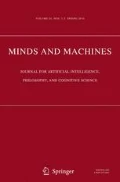Abstract
Situation theory, as developed by Barwise and his collaborators, is used to demonstrate the possibility of defining teleology (and related notions, like that of proper or biological function) in terms of higher order causation, along the lines suggested by Taylor and Wright. This definition avoids the excessive narrowness that results from trying to define teleology in terms of evolutionary history or the effects of natural selection. By legitimating the concept of teleology, this definition also provides promising new avenues for solving long standing problems in the philosophy of mind, such as the problems of intentionality and mental causation.
Similar content being viewed by others
References
Adams, E.W. (1975), The Logic of Conditionals. D. Reidel, Dordrecht, The Netherlands
Barwise, J. (1989), The Situation in Logic, CSLI Lecture Notes. CSLI, Stanford, Calif.
Barwise, J. and Etchemendy, J. (1987), The Liar: An Essay on Truth and Circularity. Oxford University Press. Oxford, U.K.
Barwise, J. and Perry, J. (1983), Situations and Attitudes, MIT Press, Cambridge, Mass.
Barwise, J. and Seligman, J. (1997), Information Flow: The Logic of Distributed Systems. Cambridge, U.K., Cambridge University Press.
Bedau, M. (1992), Where's the good in teleology? Philosophy and Phenomenological Research, 52: 781–801.
Bigelow, J. and Pargetter, R. (1987), Functions. Journal of Philosophy, 84: 181–196.
Birkhoff, G. (1940), Lattice Theory, volume 25 of Colloquium Publications. American Mathematical Society, Providence, Rhode Island.
Darwin, C. (1859), On the Origin of Species by Means of Natural Selection. Murray, London, U.K.
Davey, B.A. and Priestley, H.A. (1990), Introduction to Lattices and Order. Cambridge University Press, Cambridge, U.K.
Davidson, D. (1980), Essays on Actions and Events. Clarendon Press, Oxford, U.K.
Dawkins, R. (1987), The Blind Watchmaker. W.W. Norton & Co. New York, N.Y.
Dennett, D.C. (1995) Darwin's Dangerous Idea: Evolution and the Meanings of Life. Simon & Schuster, New York, N.Y.
Devlin, K. (1991), Logic and Information. Cambridge University Press, Cambridge, U.K.
Dretske, F.I. (1981), Knowledge and the Flow of Information. MIT Press, Cambridge, MA.
Dretske, F.I. (1981), Explaining Behavior: Reasons in a World of Causes. MIT Press, Cambridge, MA.
Eells, E. (1991), Probabilistic Causality. New York, N.Y., Cambridge University Press.
Gilson, E. (1984), From Aristotle to Darwin and Back Again: A Journey in Final Causality, Species and Evolution. University of Notre Dame Press, Notre Dame, IN.
Hardegree, G.M. (1982), An approach to the logic of natural kinds. Pacific Philosophical Quarterly, 63: 122–132.
Hitchcock, C. (1996), A theory of second order causation. Erkenntnis, 44: 369–77.
Koons, R.C. (1996), Information, representation, and the problem of error, in Jerry Seligman and Dag Westerståhl, (ed.) Logic, Language and Computation. Volume 1, pp 333–346. CSLI Publications, Stanford, Calif.
Kripke, S.A. (1972), Naming and Necessity. Harvard University Press, Cambridge, MA.
Lehmann, D. and Magidor, M. (1992), What does a conditional data base entail? Artificial Intelligence, 55: 1–60.
Leibniz, G.W. (1988), Metaphysics / Correspondence with Arnauld / Monadology. Open Court, La Salle, IL.
Lycan, W.G. (1996), Consciousness and Experience. MIT Press, Cambridge, MA.
Mackie, J.L. (1965), Causes and conditions. American Philosophical Quarterly, 2: 245–264.
Mackie, J.L. (1974), The Cement of the Universe: A Study of Causation. Clarendon Press. Oxford, U.K.
McGee, V. (1994), Learning the impossible, in Ellery Eells and Brian Skyrms, (ed.), Probability and Conditionals: Belief Revision and Rational Decision, pp 179–199. Cambridge University Press, Cambridge, U.K.
Millikan, R. (1984), Language, Thought and Other Biological Categories. MIT Press, Cambridge, MA.
Millikan, R.G. (1989), In defense of proper functions. Philosophy of Science, 56: 288–307.
Morreau, M. (1997), Fainthearted conditionals. Journal of Philosophy, 94: 187–211.
Neander, K. (1991), Functions as selected effects: The conceptual analyst's defense. Philosophy of Science, 58: 168–184.
Papineau, D. (1993), Philosophical Naturalism. Blackwell, Oxford, U.K.
Plantinga, A. Warrant and Proper Function. Oxford University Press, Oxford.
Plato, (1986), The Republic. Prometheus Books, Buffalo, N.Y.
Sorabji, R. (1964), Biological functions. Philosophical Quarterly, 14: 288–302.
Stalnaker, R. (1981), A theory of conditionals, in William L. Harper, Robert Stalnaker, and Glenn Pearce, (ed.), Ifs: Conditionals, Belief, Decision, Chance and Time, pp. 41–56. Dordrecht, D. Reidel.
Stampe, D. (1977), Towards a causal theory of linguistic representation. in P. French, T. Uehling, and H. Wettstein, (ed.), Minnesota Studies in Philosophy, 2, pages 42–63. University of Minnesota Press, Minneapolis, MI.
Taylor, C. (1964), The Explanation of Behavior. Routledge & Kegan Paul, London, U.K.
Woodfield, A. (1976), Teleology. Cambridge University Press, Cambridge, U.K.
Wright, L. (1976), Teleological Explanations. University of California Press, Berkeley, CA.
Author information
Authors and Affiliations
Rights and permissions
About this article
Cite this article
Koons, R.C. Teleology as Higher-Order Causation: A Situation-Theoretic Account. Minds and Machines 8, 559–585 (1998). https://doi.org/10.1023/A:1008366512300
Issue Date:
DOI: https://doi.org/10.1023/A:1008366512300




